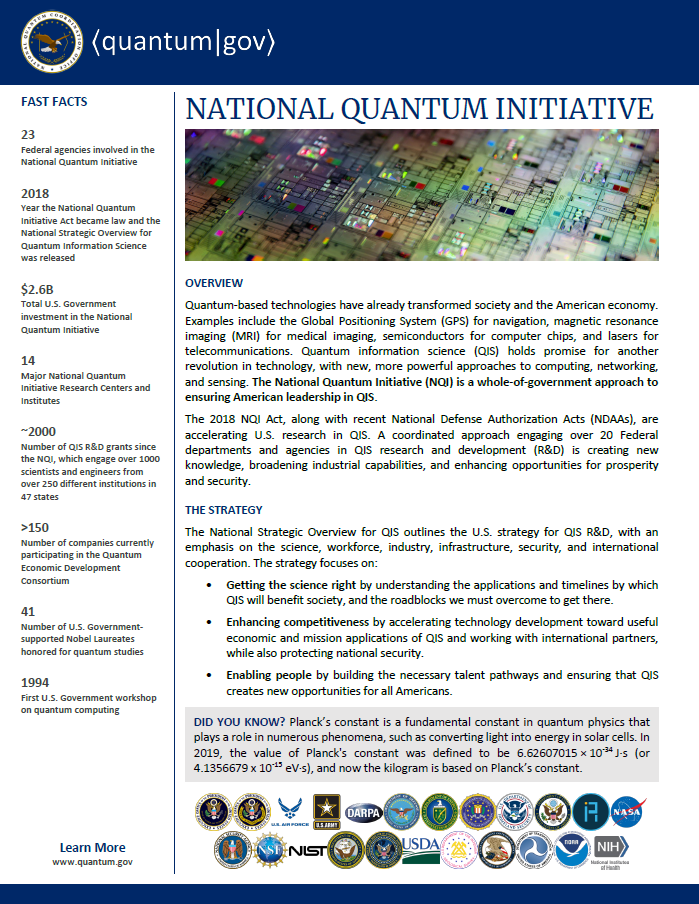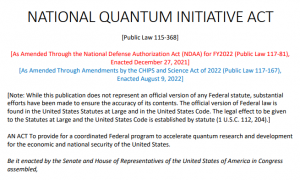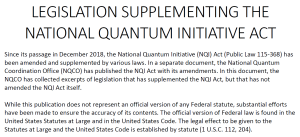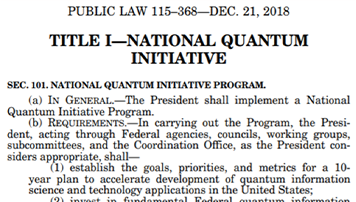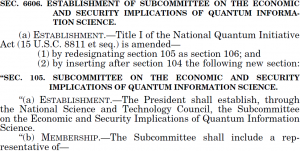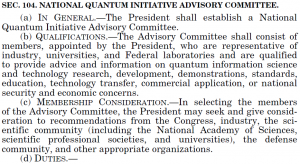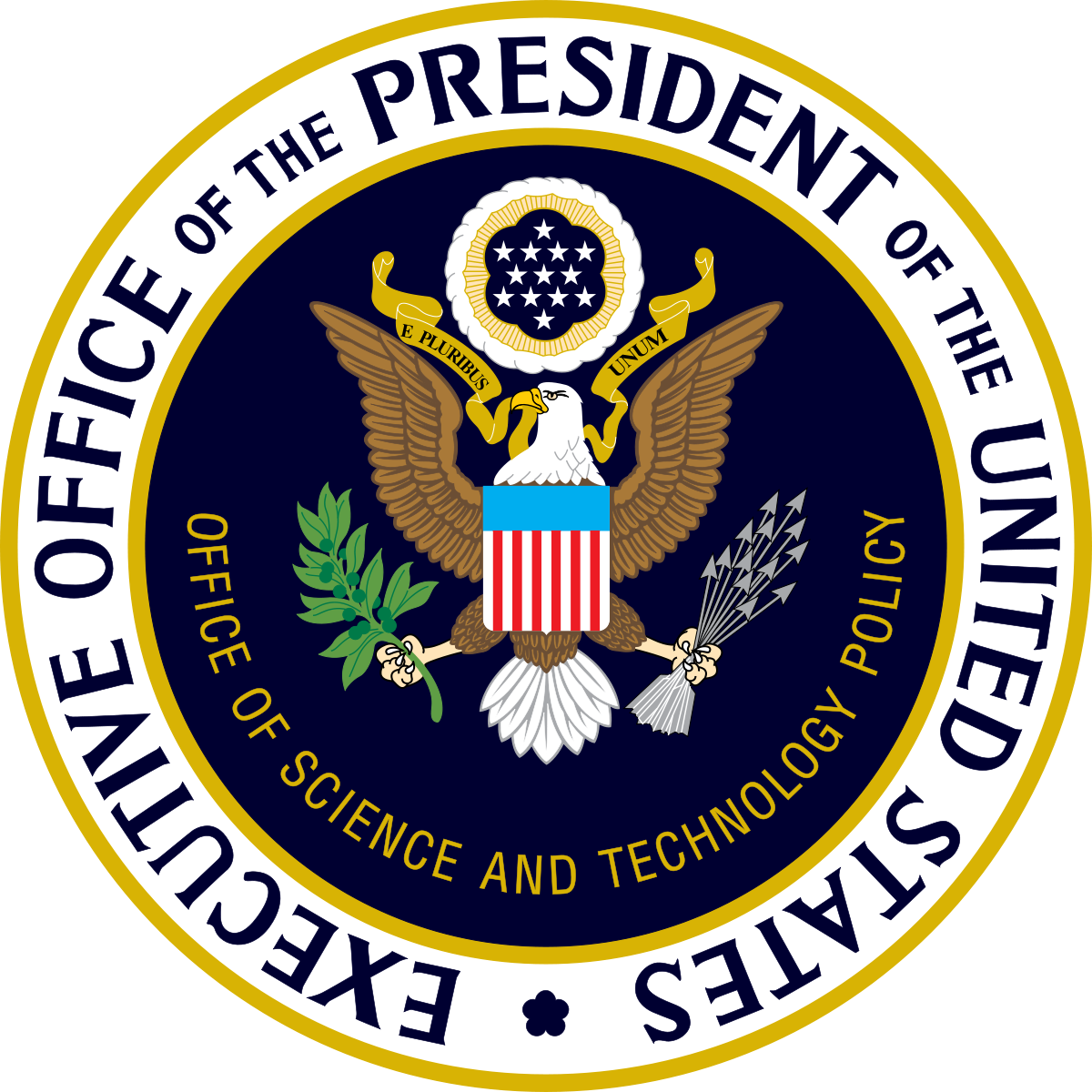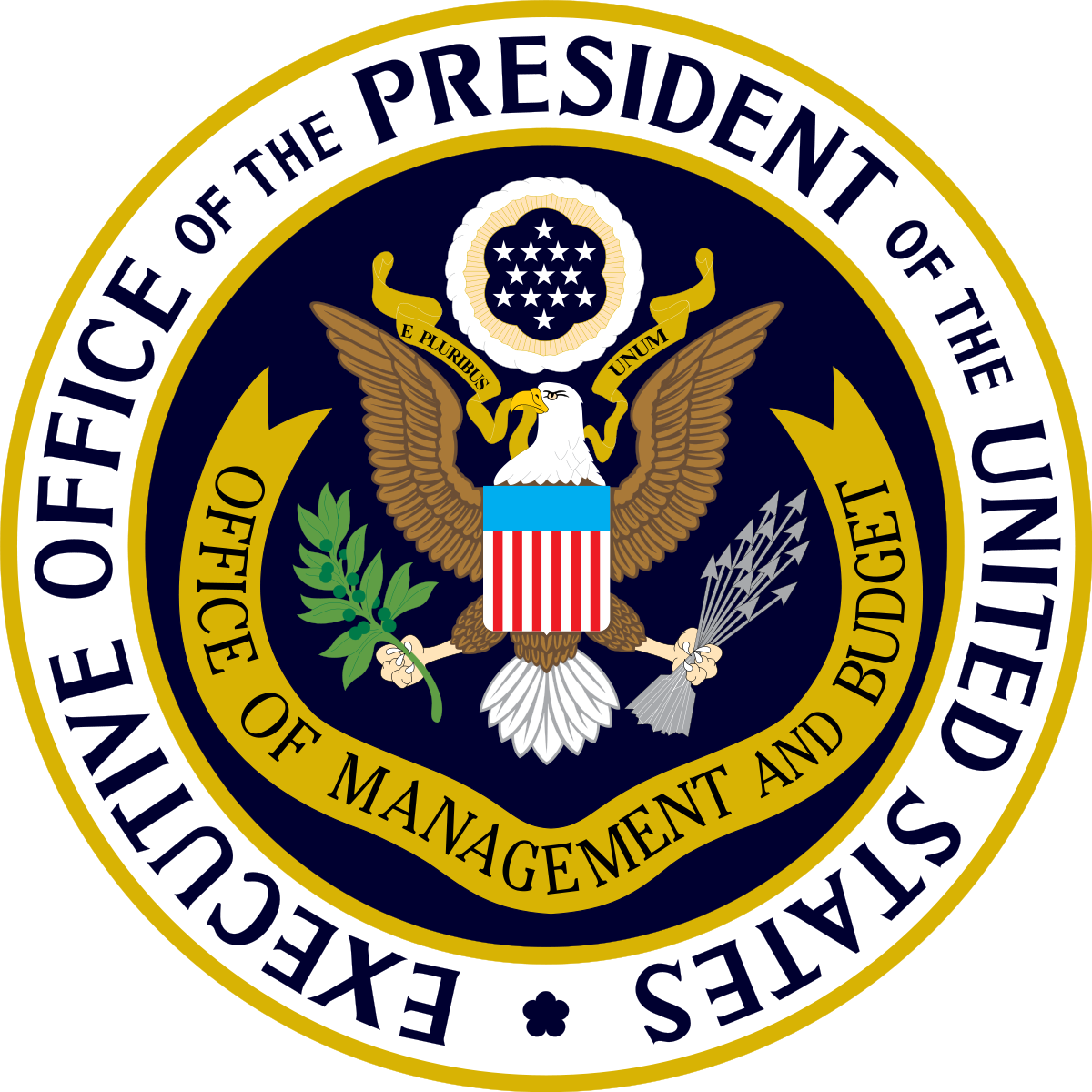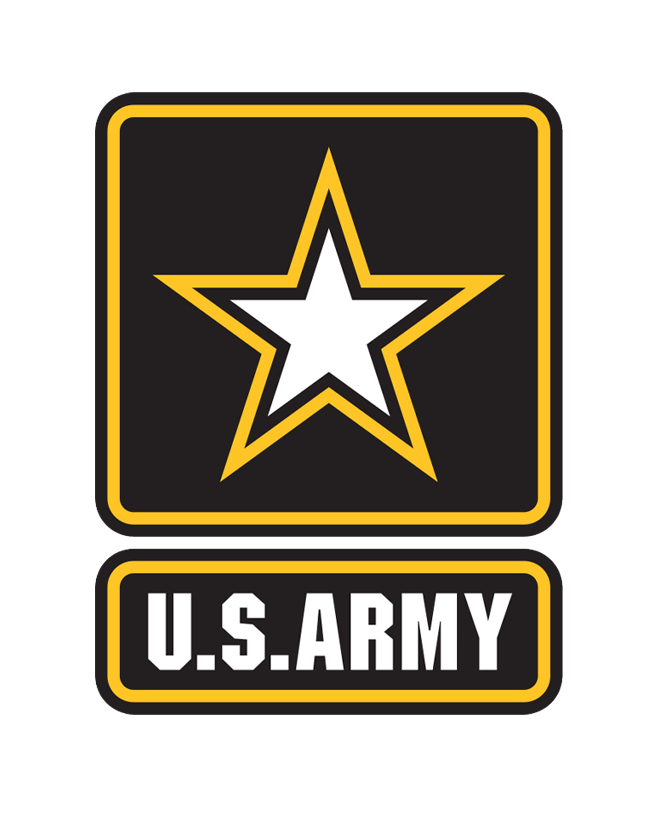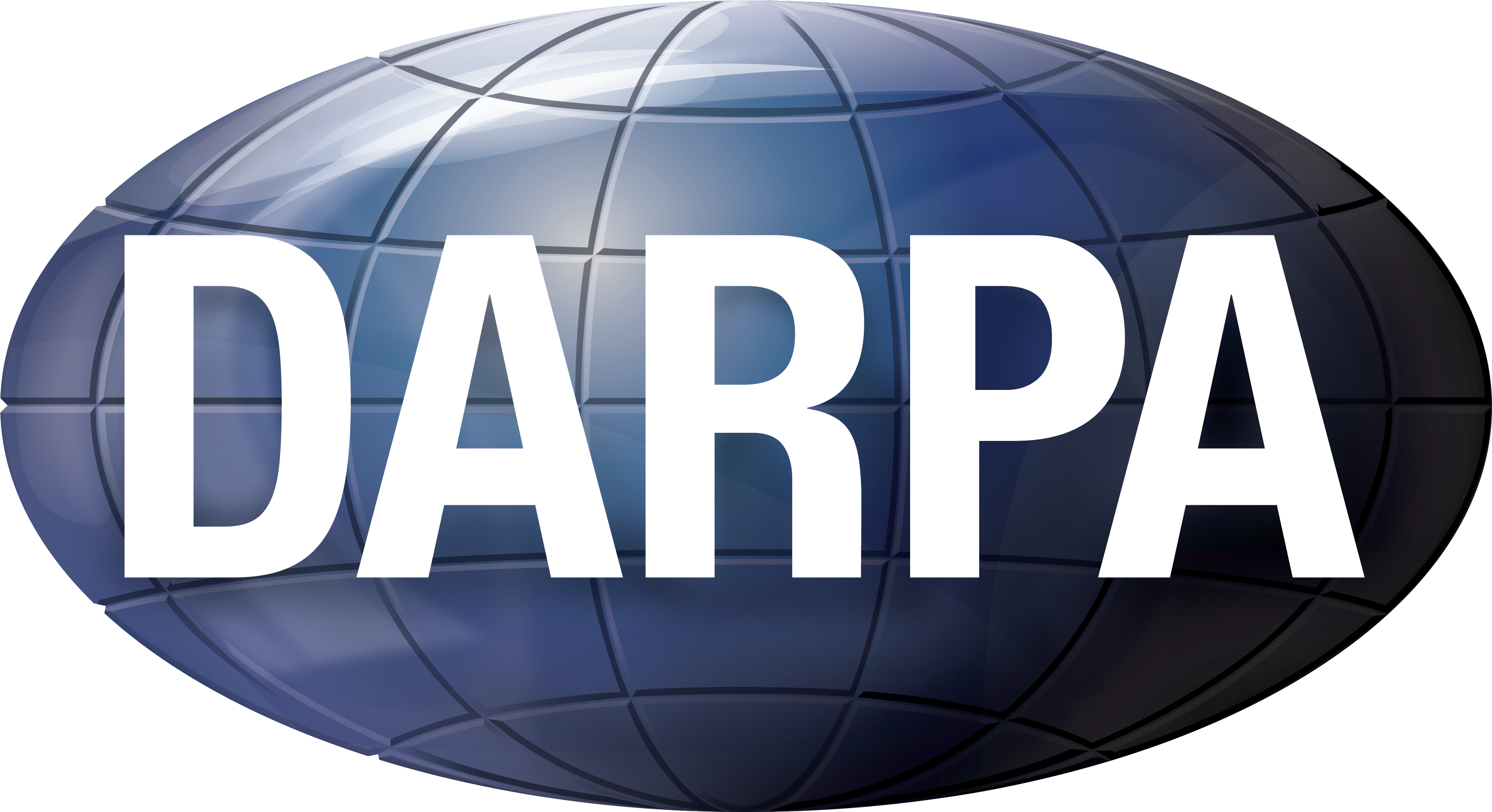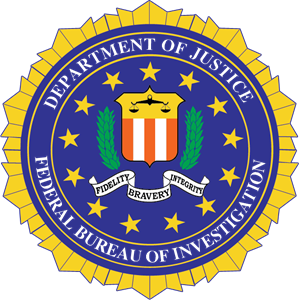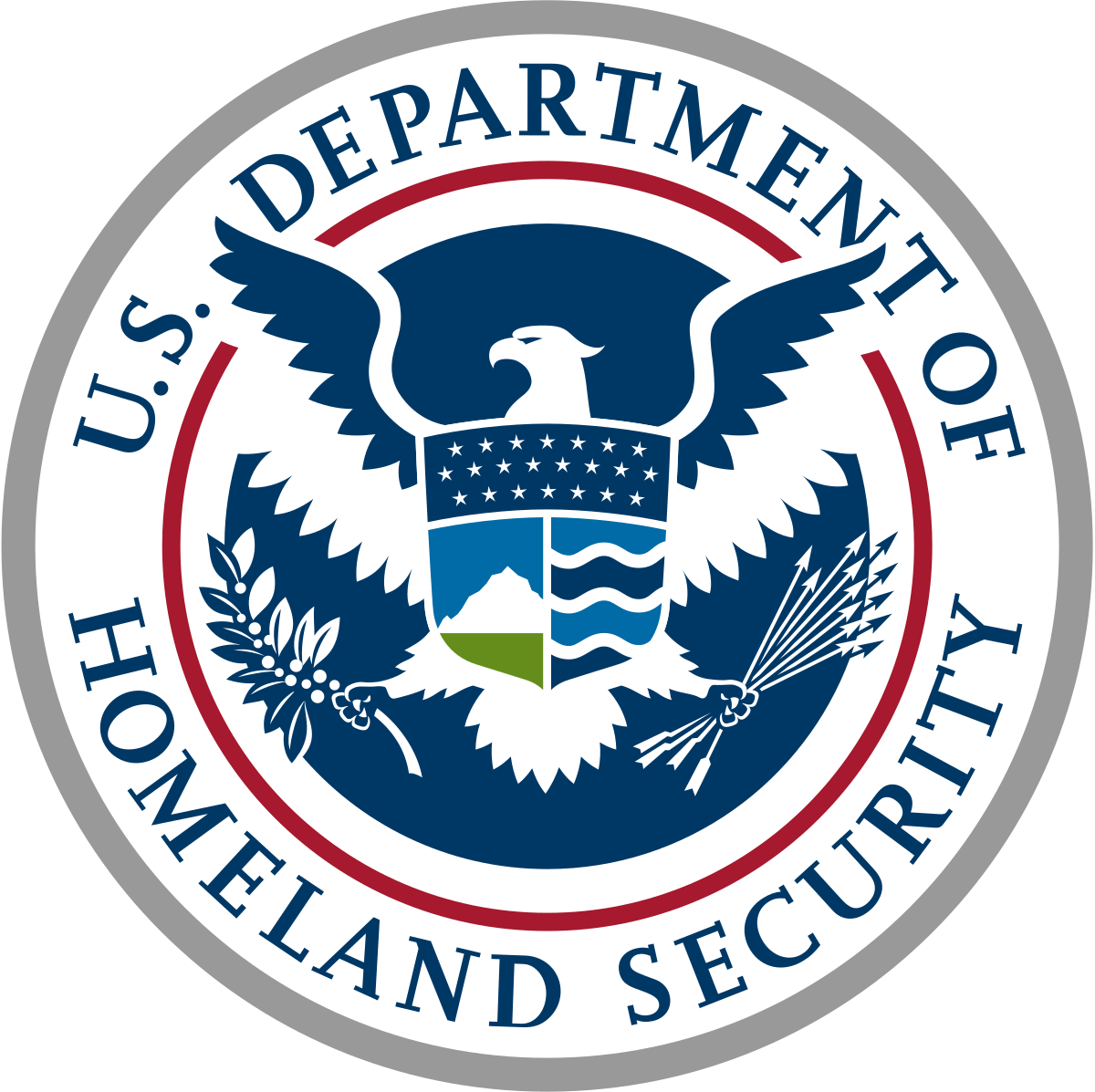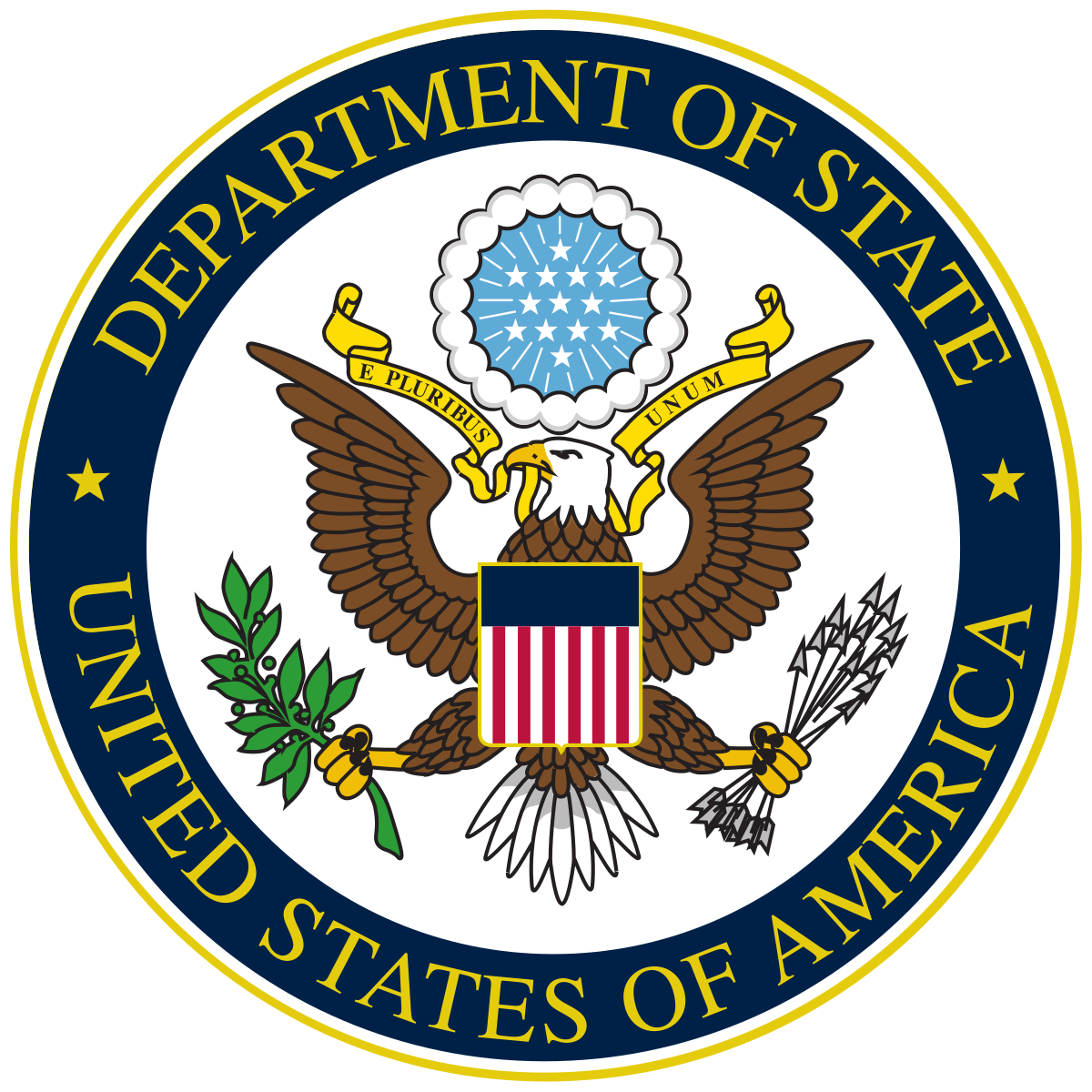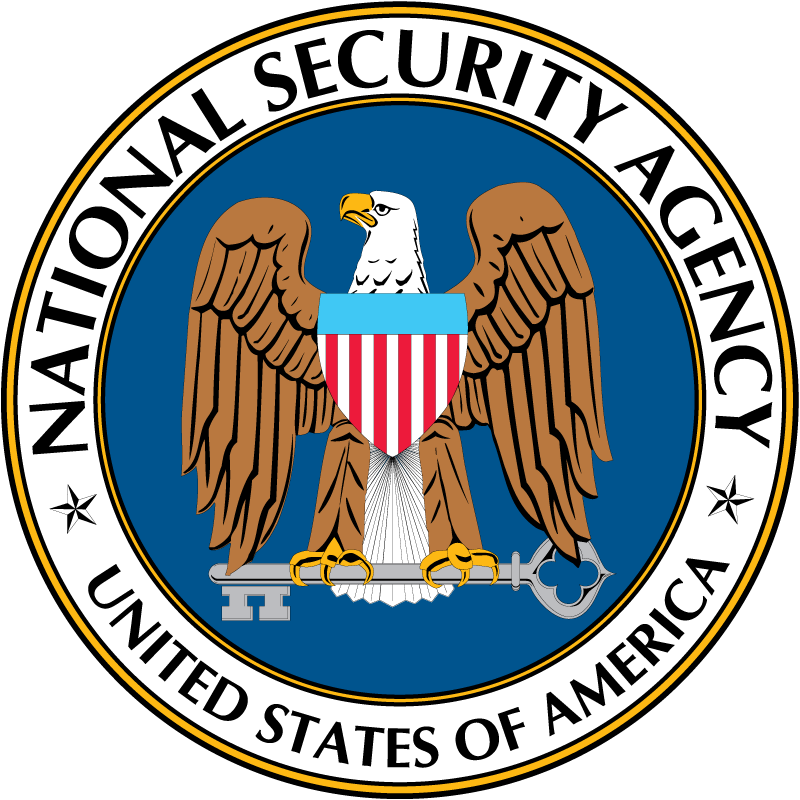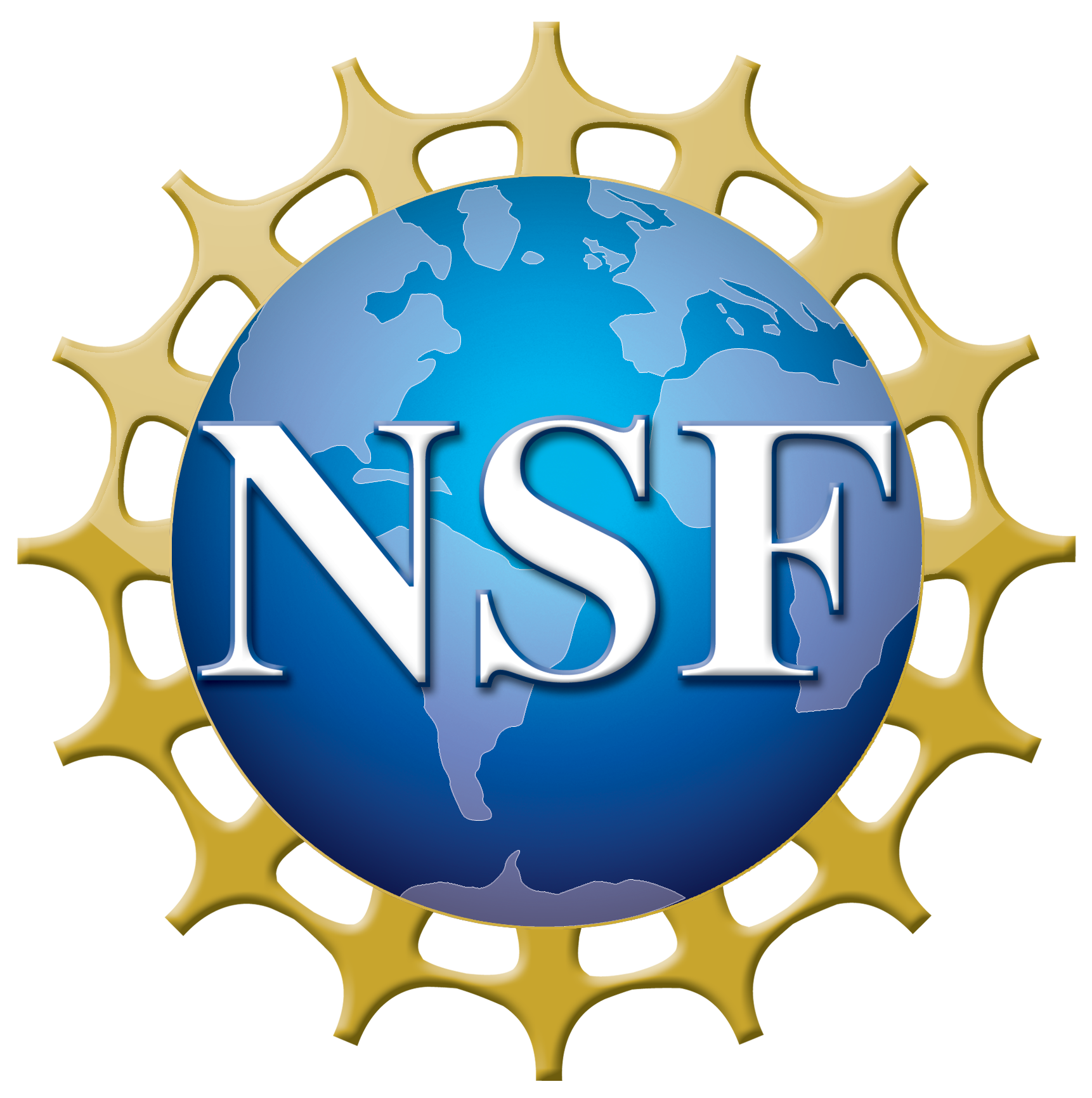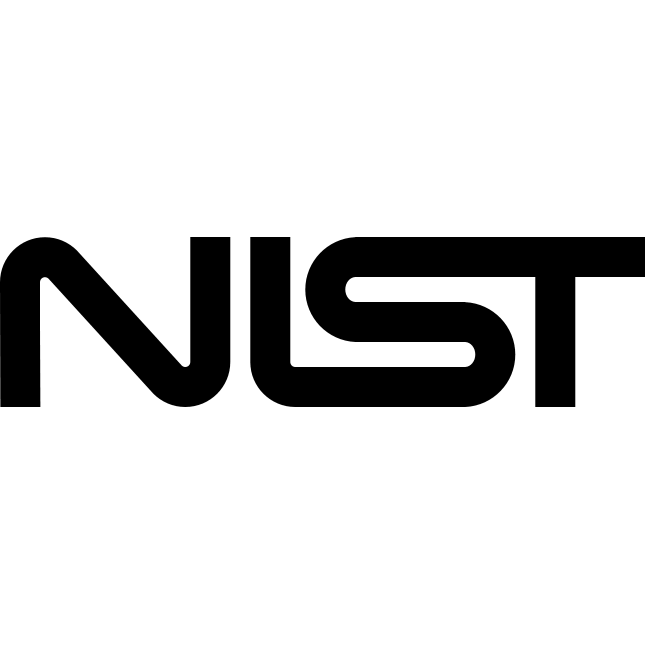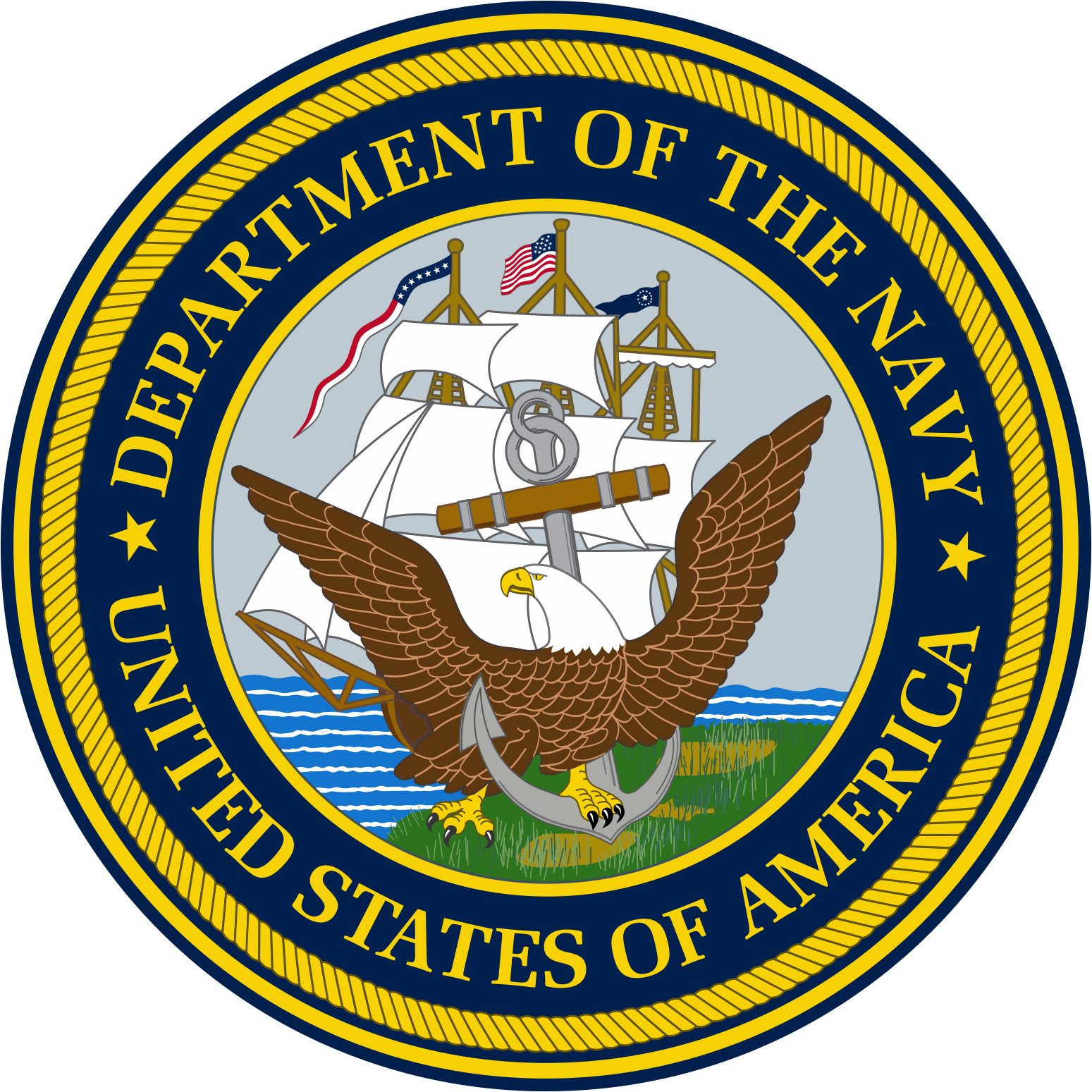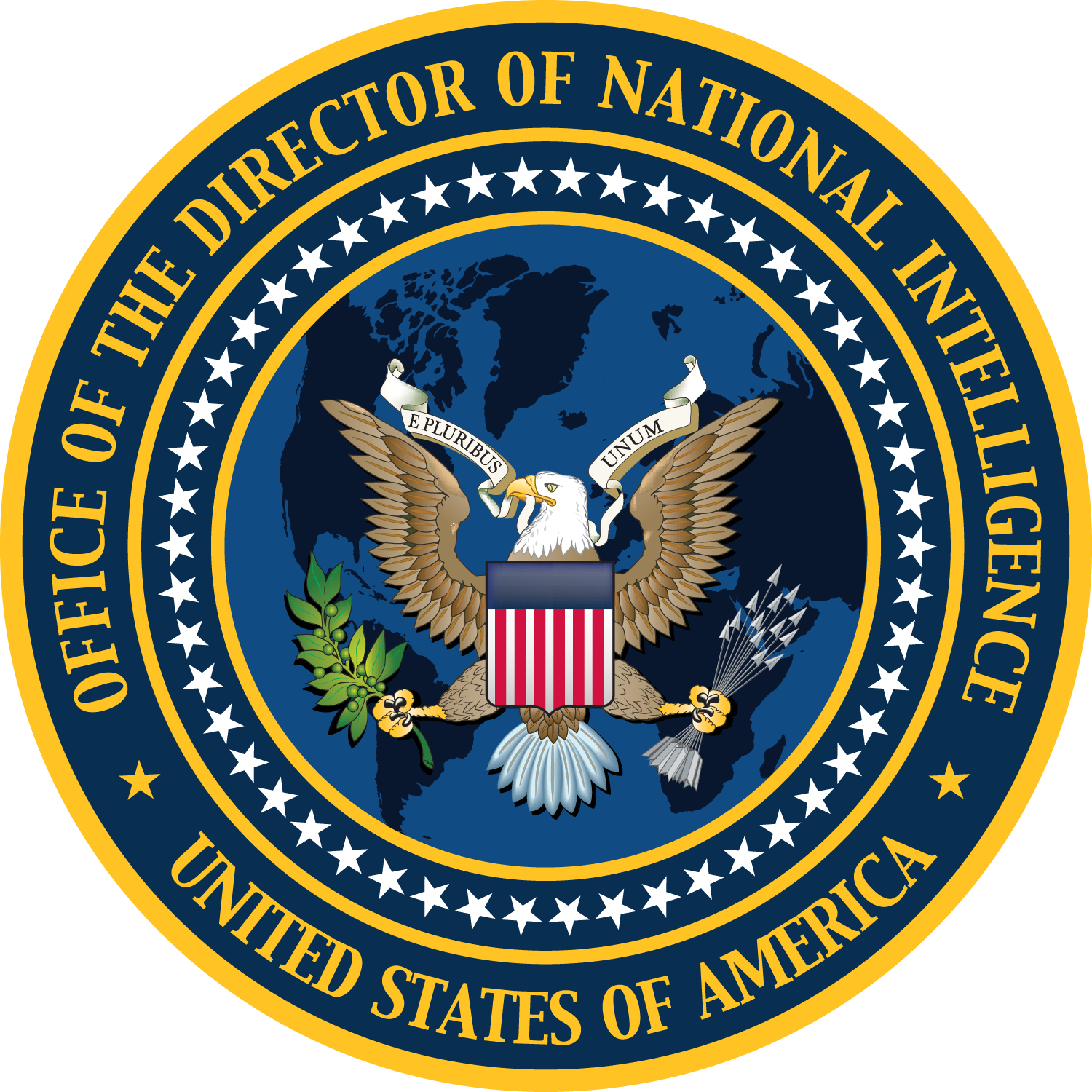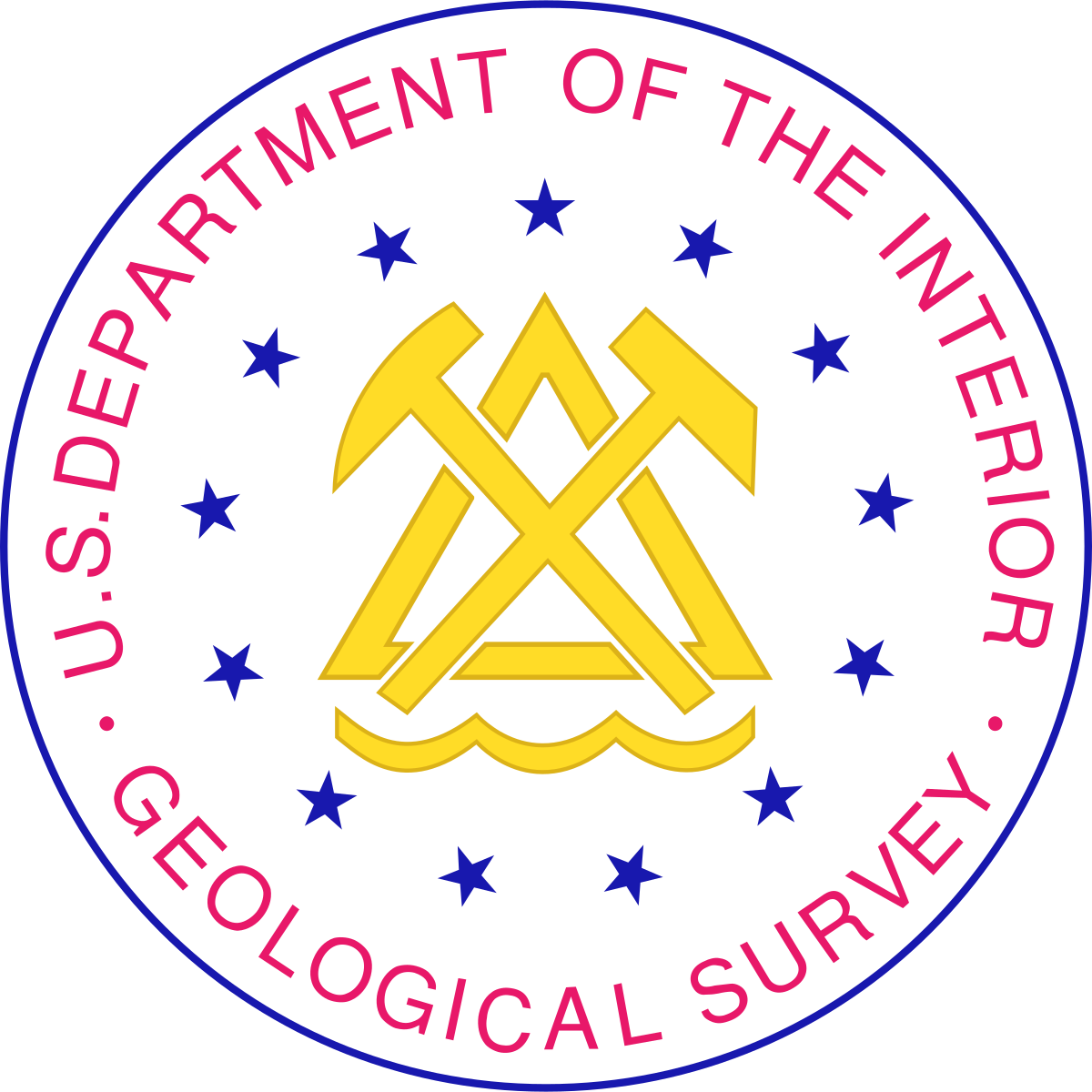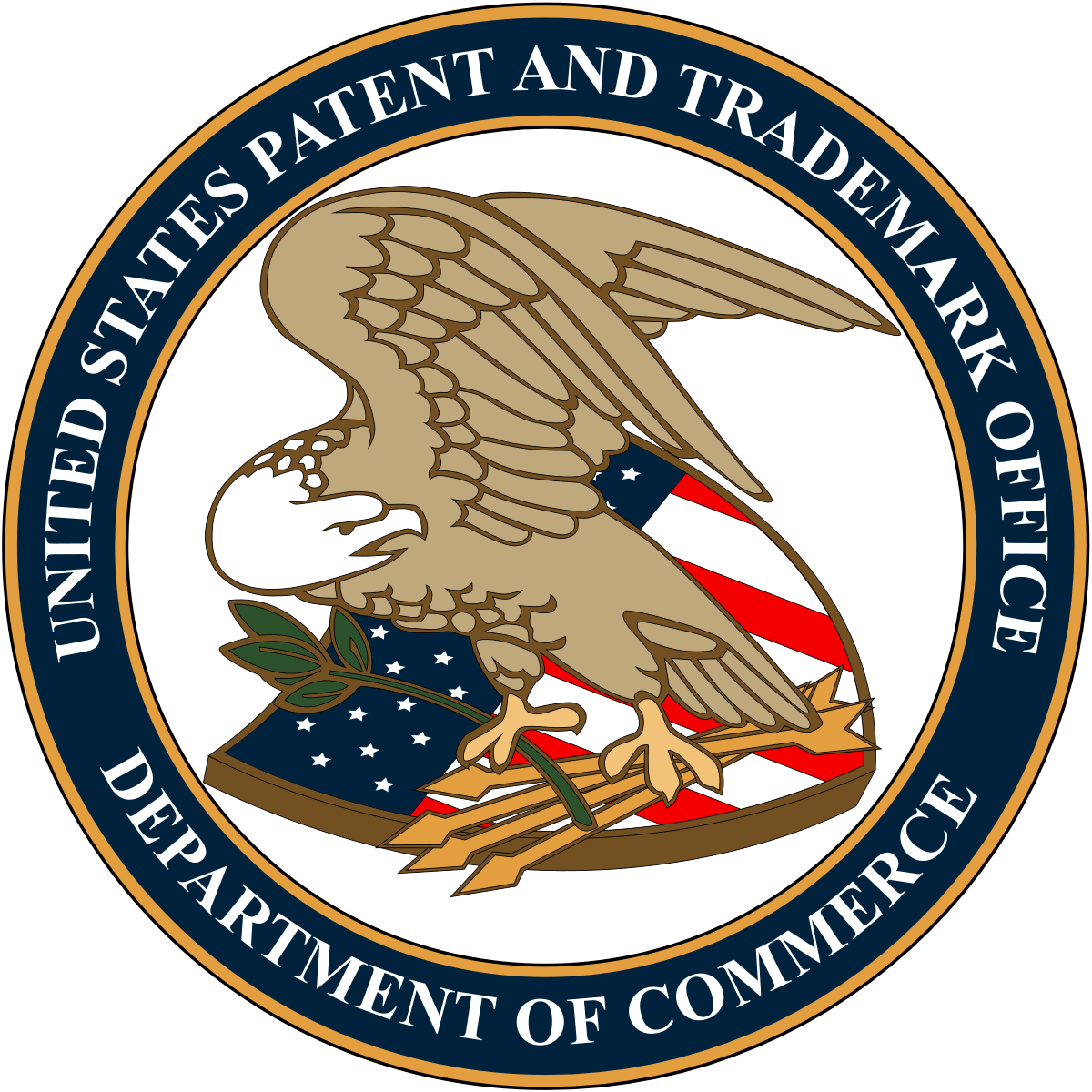Overview
Quantum-based technologies have already transformed society and the American economy. Examples include the Global Positioning System (GPS) for navigation, Magnetic Resonance Imaging (MRI) for medical imaging, semiconductors for computer chips, and lasers for telecommunications. Quantum information science holds promise for another revolution in technology, with new, more powerful approaches to computing, networking, and sensing. The National Quantum Initiative is a whole-of-government approach to ensuring the continued leadership of the United States in quantum information science and its technology applications.
About the logo <quantum|gov>
In quantum physics, the notation to represent a quantum system, such as the state of a quantum computer, is the so-called “ket” notation. For example, the ket |QC> would represent the state of a quantum computer. Following this terminology, <quantum|gov> then represents the overlap of |quantum> and |government>, which is what the national effort is all about.
QIS – Quantum Information Science

Quantum Information Science (QIS) emerges from a deeper consideration of how quantum physics (our description of the world at the microscopic level) has implications for information science (how real systems like computers process information). Quantum information technology takes advantage of the fundamentally quantum properties of matter to design new types of computers, sensors, and networks which enable new speed, precision, or functionality. Building on key QIS scientific discoveries since the 1980s, pioneering experiments starting in the 1990’s, quantum engineering from the 2000s, and commercial activity today, the world is on the cusp of a second quantum revolution. The prospects for innovation fueled by QIS, with implications for our economic prosperity and national security, motivate an all-of-government and all-of-nation approach to coordinating QIS activities in the United States.
Legislation
Overview
The National Quantum Initiative was established by the National Quantum Initiative Act in 2018. This act was amended by the National Defense Authorization Act (NDAA) for Fiscal Year 2022 and by the CHIPS and Science Act of 2022. A document prepared by the National Quantum Coordination Office, showing the National Quantum Initiative Act with these amendments is available here.
In addition, the NDAA for Fiscal Years 2019, 2020, and 2022, as well as the CHIPS and Science Act of 2022, all contain QIS-relevant legislation that did not amend the 2018 National Quantum Initiative Act. A document prepared by the National Quantum Coordination Office containing QIS-relevant excerpts of these pieces of legislation that supplement, but do not amend the NQI Act, is available here.
Although the National Quantum Initiative Act only authorizes research activities for the National Institute of Standards and Technology, the National Science Foundation, and the Department of Energy, the National Quantum Initiative is a whole-of-government approach that extends beyond these three agencies. Executive Order 14073 clarifies that the National Quantum Initiative, “encompasses contributions from across the Federal Government, as exemplified by the QIS research, development, demonstration, and training activities pursued by executive departments and agencies (agencies) with membership on either the National Science and Technology Council Subcommittee on Quantum Information Science or the National Science and Technology Council Subcommittee on the Economic and Security Implications of Quantum Science.”
National Quantum Initiative Act
The National Quantum Initiative Act (NQI Act) was signed into law by President Trump on December 21, 2018 “to accelerate quantum research and development for the economic and national security of the United States.” The NQI Act authorizes the National Institute of Standards and Technology, the National Science Foundation, and the Department of Energy to strengthen QIS Programs, Centers, and Consortia. The NQI Act also calls for a coordinated approach to QIS Research and Development efforts across the United States Government, including the civilian, defense, and intelligence sectors. To guide these actions, the NQI Act legislates some responsibilities to the National Science and Technology Council (NSTC) Subcommittee on Quantum Information Science, the NSTC Subcommittee on the Economic and Security Implications of Quantum Science, the National Quantum Coordination Office, and the National Quantum Initiative Advisory Committee. Recognizing that QIS technologies have commercial and defense applications, additional authorization for QIS Research and Development is legislated by the National Defense Authorization Act. Civilian, defense, and intelligence agencies all have a long history of investments in QIS and have a stake in future QIS discoveries and technology development. The National Quantum Initiative now provides an overarching framework to strengthen and coordinate QIS Research and Development activities across U.S. Departments and Agencies, private sector industry, and the academic community.
NDAA and Defense Legislation for QIS
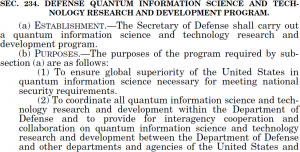
The National Defense Authorization Act (NDAA) for Fiscal Year 2019 and the NDAA for Fiscal Year 2020 legislate the Department of Defense to carry out and support quantum information science and technology research and development. The NDAA authorizes the Department of Defense to increase the technology readiness level of quantum information science technologies under development in the United States, support the development of a quantum information science and technology workforce, and enhance awareness of quantum information science and technology. The NDAA provides authorization to coordinate all quantum information science and technology research and development within the Department of Defense, including through consultation with the National Quantum Coordination Office, the NSTC Subcommittee on Quantum Information Science, and other appropriate Federal and private sector entities. The NDAA for Fiscal Year 2020 further authorizes the establishment of Quantum Information Science Research Centers. The NDAA for Fiscal Year 2022 amended the National Quantum Initiative Act to include the NSTC Subcommittee on the Economic and Security Implications of Quantum Science.
CHIPS and Science Act of 2022

The CHIPS and Science Act of 2022 amended the National Quantum Initiative Act to authorize research and development in quantum networking infrastructure, the development of standards in quantum networking and communication, the establishment of a program to facilitate a competitive, merit-reviewed base process for access to U.S.-based quantum computing resources for research purposes, and the integration of quantum information science and engineering into the science, technology, engineering, and mathematics curriculum at all education levels. It also explicitly includes quantum information science in the new National Science Foundation Directorate for Technology, Innovation, and Partnerships, as well as in existing Federal scholarship programs.
Coordinating Bodies
The National Quantum Initiative is carried out by federal agencies, and the National Quantum Initiative Act, as amended, calls for interagency coordination through the National Science and Technology Council (NSTC) Subcommittee on Quantum Information Science and the NSTC Subcommittee on Economic and Security Implications of Quantum Science. The NQI Act also legislated the formation of the National Quantum Initiative Advisory Committee to provide independent assessments and recommendations about the National Quantum Initiative. Finally, the NQI Act established the National Quantum Coordination Office to oversee the interagency coordination of the NQI Program, carry out the daily activities needed for coordinating and supporting the NQI, and provide technical and administrative support to the committees.
Below is more information about each body:
SCQIS – Subcommittee on Quantum Information Science
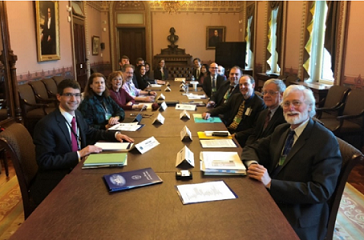
The NSTC Subcommittee on Quantum Information Science coordinates Federal research and development in quantum information science and related technologies under the auspices of the NSTC Committee on Science. The aim of this R&D coordination is to maintain and expand U.S. leadership in quantum information science and its applications over the next decade. The SCQIS is co-chaired by the White House Office of Science and Technology Policy, the National Institute of Standards and Technology, the National Science Foundation, and the Department of Energy.
ESIX – Subcommittee on the Economic and Security Implications of Quantum Science
The NSTC Subcommittee on the Economic and Security Implications of Quantum Science was established to ensure that economic and security implications of QIS are understood across the agencies (see NDAA Fiscal Year 2022: P.L. 117-81; Sec. 6606). The subcommittee provides a national security perspective to QIS related research. The ESIX Subcommittee coordinates with other NSTC subcommittees, such as the SCQIS, to ensure that the economic and national security implications of basic research and development in QIS, along with derived technologies are fully understood. The subcommittee is co-chaired by the White House Office of Science and Technology Policy, Department of Defense, Department of Energy, and the National Security Agency.
NQIAC – The National Quantum Initiative Advisory Committee
The National Quantum Initiative Advisory Committee is the Federal Advisory Committee called for in the NQI Act. The NQIAC is tasked to provide an independent assessment of the NQI Program and to make recommendations for the President, Congress, and the NSTC SCQIS and ESIX Subcommittees to consider when reviewing and revising the NQI Program. The NQIAC consists of leaders in the field from industry, academia, and the Federal laboratories.
The NQIAC was first established by Executive Order 13885 on August 30, 2019. It was subsequently enhanced by Executive Order 14073 on May 4, 2022. More information about the NQIAC’s charter, members, and meetings is available here.
NQCO – The National Quantum Coordination Office
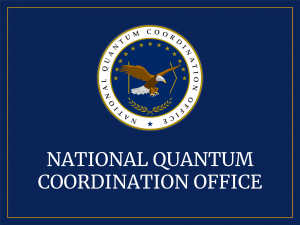
Located in the White House Office of Science and Technology Policy, the National Quantum Coordination Office is legislated by the NQI Act to carry out the daily activities needed for coordinating and supporting the NQI. The Coordination Office is tasked with providing technical and administrative support to the SCQIS, ESIX and the NQIAC as well as overseeing the interagency coordination of the NQI Program. The NQCO serves as the primary point of contact on Federal civilian quantum information science and technology activities and conducts public outreach, including the dissemination of findings and recommendations of the SCQIS and the NQIAC, as appropriate. The NQCO staff are federal employees on detail assignments from across the government. To learn more about the NQCO and its staff click here.
AGENCIES
Numerous federal agencies are engaged with the National Quantum Initiative. Each agency brings its own unique capabilities and mission needs.
NIST – The National Institute of Standards and Technology (NIST) promotes U.S. innovation and industrial competitiveness by advancing measurement science, standards, and technology in ways that enhance economic prosperity. As authorized by the NQI Act, NIST is coordinating consortia focusing on quantum technologies, and maintaining fundamental QIS R&D programs. NIST has been a leader in QIS R&D for over three decades., including a seminal workshop on QIS at its Gaithersburg campus in 1994. You can learn more about ongoing quantum activities at NIST here: https://www.nist.gov/topics/quantum-information-science.
NSF – The National Science Foundation (NSF) promotes the progress of science by funding basic research at approximately 2000 academic institutions throughout the United States. As authorized by the NQI Act, NSF is strengthening core programs and establishing new institutes focusing on fundamental QIS research and training. NSF has supported QIS research since the field’s inception in the early 1980s. You can learn more about ongoing quantum information science and engineering research at NSF here: https://nsf.gov/quantum.
DOE – The Department of Energy (DOE) ensures America’s prosperity and security through several mechanisms including basic and applied scientific research, discovery and development of new technologies, and scientific innovation. The Energy Department’s National Laboratories are a system of intellectual assets unique among world scientific institutions and serve as regional engines of economic growth for states and communities across the country. As authorized by the NQI Act, DOE is strengthening core programs and establishing new Centers focusing on QIS research. You can learn more about ongoing QIS activities at DOE here: https://science.osti.gov/Initiatives/QIS.
NASA – The National Aeronautics and Space Administration (NASA) drives advances in science, technology, aeronautics, and space exploration to enhance knowledge, education, innovation, economic vitality and stewardship of Earth. NASA’s research portfolio includes some activities focusing on, and motivated by, quantum information science. You can learn about some QIS activities at NASA here: https://ti.arc.nasa.gov/tech/dash/groups/quail/.
DOD – The Department of Defense (DOD) engages in basic research, defined as the ‘systematic study directed toward greater knowledge or understanding of the fundamental aspects of phenomena and of observable facts without specific applications towards processes or products in mind.’ DOD has supported fundamental QIS research for three decades, and continues to invest in basic QIS R&D activities via several DOD offices, agencies, and laboratories. These include: the Office of the Under Secretary of Defense for Research and Engineering (OUSD(R&E)); the Defense Advanced Projects Agency (DARPA); the Army Research Laboratory (ARL), the Army Research Office (ARO); the Naval Research Laboratory (NRL); the Office of Naval Research (ONR), the Air Force Research Laboratory (AFRL); and the Air Force Office of Sponsored Research (AFOSR).
NSA/LPS – Laboratory for Physical Science (LPS) is a unique organization where university, industry, and federal government scientists collaborate on research in advanced communication, sensing, and computer technologies. The LPS currently houses four main divisions related to information science and technology, including Solid-State and Quantum Physics. You can learn more about QIS activities at LPS here: https://www.lps.umd.edu/solid-state-quantum-physics/index.html.
IARPA – The Intelligence Advanced Projects Activity (IARPA) sponsors several applied research programs that explore quantum computing. You can learn more about QIS activities at IARPA here: https://www.iarpa.gov/index.php/research-programs/quantum-programs-at-iarpa.


